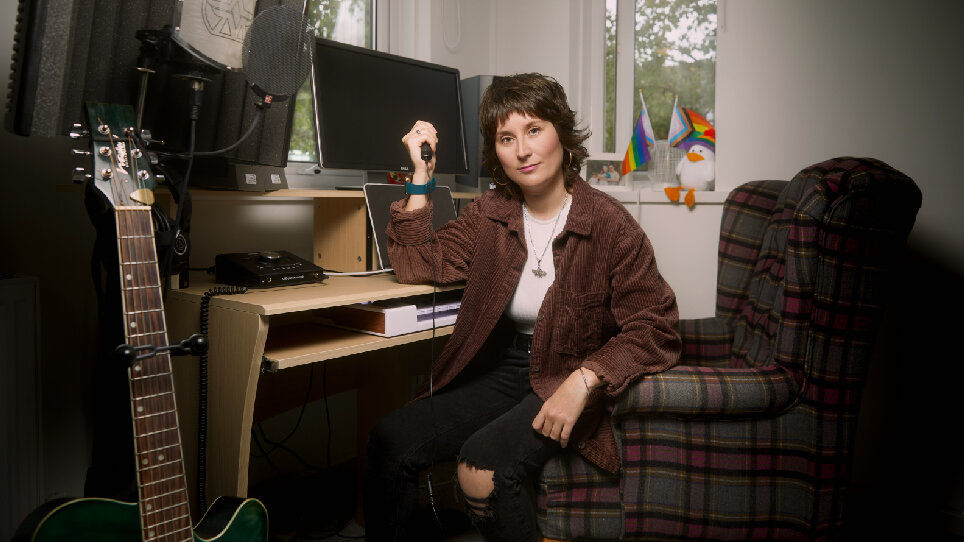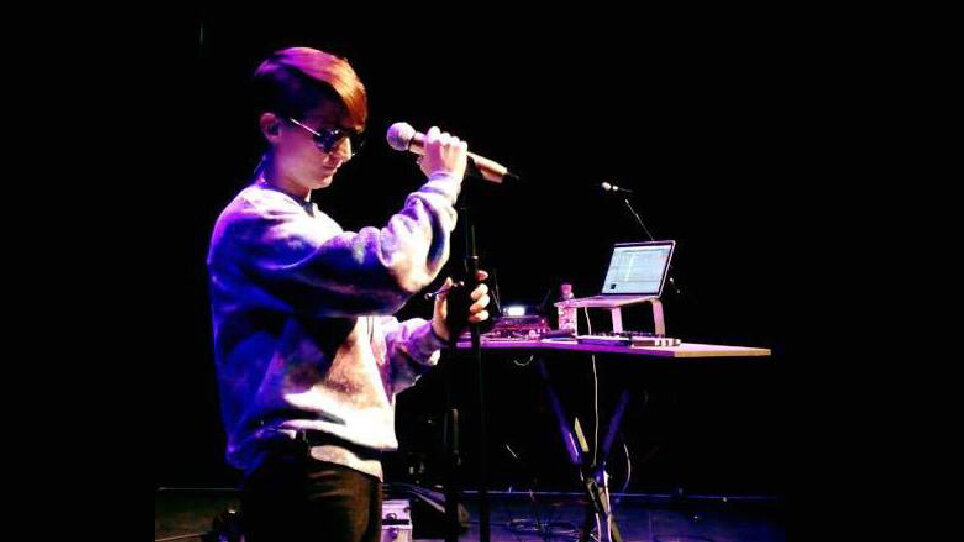Zahra's story
Zahra, 35, a singer-songwriter, was diagnosed last year. In her full interview, below, Zahra describes the catharsis of making music about subjects that are difficult to talk about, how male stereotypes harm autistic women and the joy of autistic support groups.
My story
I chose to be photographed in my home studio because I feel really comfortable in this space. I feel like I can escape in here. The outside world is difficult because I’m autistic, but I also have some health problems as well, which makes it quite difficult sometimes to get out and be around people. Here I can be someone I can't be outside. And if I'm unwell or not feeling great, I always have this, which makes me feel better.
Music is something that, even if you feel bad, you can still do it. To be honest, if I'm feeling happy, I don't tend to do music as much. If I'm in a happy relationship, I'm like, ‘What do I write about?’ Good songs come from heartache, I think. It's cathartic. Even with autism, it's like a way to release some stuff that maybe you can't talk about. When I had a really awful break-up, I found it really difficult to talk about it. But I was able to tell the story through music and making a song. It feels like therapy. But it’s free!

"Every time I brought autism up to a professional who had the ability to put me on track to get a diagnosis, it was just not really explored. It makes you feel a bit gaslit."
Getting the autism diagnosis was really important for me. Over the years, I mentioned it to mental health professionals on numerous occasions and I'd had people in my family and friends, and partners especially, say they think I might be autistic. I tried flirting with someone once and they asked me if I was autistic! We ended up being in a relationship after that. But every time I brought it up to a professional, where they had the ability to put me on track to get a diagnosis, it was just not really explored. It makes you feel a bit gaslit.
It was only when I started looking at YouTube videos of autism in women that it was so different, and I was like, ‘Oh’. When I looked at the normal stuff on certain websites, it's all about how it presents in men. So, I felt like, [maybe I'm not.] But then when I looked at how it affects women, I was like, ‘That is me.’ One doctor I had was really lovely and she said she would put me through the process. That was last year, when I was 34. But it was going to be a four year wait. And once I get something in my head, I need to know. I felt like, I cannot wait four years; then I'll be 38! So, I paid privately to have it done and I managed to get it done in two weeks.
"I started looking for support and I found the National Autistic Society and I joined a women's group. And I just feel so good about it now."
It was a real build up before and real mixed emotions, because you're having to talk about your childhood and stuff. Building up to it, you're like: but what if I'm not autistic? Then what? If I'm not, then I just have all this other stuff I need to figure out.
But when I actually got the diagnosis, the week after, I felt terrible because I was like, what do I do with this now? I started looking for support and I found the National Autistic Society and I joined a women's group. And I just feel so good about it now. Even thinking back to things that were traumatic in the past; in these groups with other women, we've talked about that stuff and, because they share their experiences, we're all laughing about it and it's something you never, ever thought you would laugh about. So, yeah, it feels really good.
The difference having the diagnosis has made has mainly been within me. Before I had the diagnosis, I felt like I had to be so focused on trying to make myself better and I was just frustrated that I couldn't. I was getting therapy from the age of 13 and I always had struggled and been labelled as anxious. It was very difficult. Having got the diagnosis, I stopped beating myself up about it and I became a bit more relaxed, not trying to push myself to try to be ‘normal’ and actually just stop trying to mask.
"People have said, ‘Since you've had your autism diagnosis, you seem more autistic.’ But I've always been this way. I just tried to bury it, and it made me so ill. I can't change who I am, but I don't want to now."
For example, I get this thing when I'm walking with someone – I've always had it – if we separate around a pole, it makes me feel uncomfortable. But now I feel like I can just say, ‘Can we walk on this side?’ But before, I would always have kept all of this stuff inside me. A lot of people have said, ‘Since you've had your autism diagnosis, you seem more autistic.’ But I feel like, no, I've actually always been this way. I've just really tried to bury it, and it made me so ill. Now, in my mind, I feel like airier. Not like a weight's been lifted, because obviously I can't change who I am, but I don't want to now.
Growing up as an undiagnosed autistic person was very difficult. I'm lucky, in a way, because I have an older sister. She's two years older than me and very outgoing, always running off and making friends. Whereas I was very clingy to my mum. People would come to our house when we were younger, and my mum was like, ‘Oh, your friends have come, they want you to come out and play.’ And I would be watching TV upside down and just be like, ‘Tell them I'm busy.’ But because I had my sister, and we were close, I would do things with her.
Primary school wasn't so bad, but secondary school was hell, I found that really, really difficult. If someone touched me, I would be quite violent. I’ll give an example. In design technology once, we were making copper poles and mine rolled off the table. I bent over to grab it and this boy jokingly pretended to hump me. So I grabbed the pole and smacked him across the head with it. I got in a lot of trouble for that.

I would struggle with getting in trouble. I would struggle with rules – not the rules, I would understand the rules and I would follow the rules – but when I then found the teacher wasn't following the rules that they were setting, or they were doing it for one person and not the other, I would really, really find that difficult. So I didn't do very well in school and I ended up getting kicked out.
"The research is mostly done on white men or boys. It's not just women being left out, it's people of colour as well. There's just not enough research and then we get left behind."
I think it's really important that people understand autism in women. I saw a meme that said, ‘Boy at two: autistic. Girl at two: shy. Boy at ten: autistic. Girl at ten: sensitive. Boy at 12: autistic. Girl at 12: bipolar disorder.’ And then it went on to, 'Girl at 25: autistic, but just doing it for attention.’ A lot of women I've talked to have said that's their experience. And I do feel like that. As with most things, in the medical world, the research is mostly done on white men or boys.
It's not just women being left out, it's people of colour as well. There's just not enough research and then we get left behind. Then what happens when we're older? We have to pay for it all ourselves to figure it out. And actually, we probably don't have that much money because we're struggling with our mental or physical health and may not have jobs. It should be done when we're younger.

I'm lucky because I have my mum and she's very supportive. I say to my mum, ‘Imagine people that don't have anyone like you, what do they do?’ If they don't have any support or finances, they just don't get any help or diagnosis and they're just alone. So, yeah, I think that's really important. It's not all about the men. But I have also met older guys now that hadn't been diagnosed and the only reason they're finding out now is because their children have just got a diagnosis. So I think the more awareness that's raised for everyone, the better it is for everyone.
I wanted to take part in this campaign because I just thought it was really important. I haven't told a lot of people about my diagnosis and I was a bit worried about it, but then I just thought, no, it is important because I really struggled for so long. And it's only when you see other people like you, or watch or read about them, and you think, ‘That sounds like me.’ And then they might start looking into it like I did and then find some support or join a group, or just understand themselves better.
"I joined a group for autistic women, and then I went to a meeting with a children's group and a mixed group. And at one point, I just sat there, looked around, and I felt, ‘Oh, I feel like I belong here’."
I joined a group for autistic women, and then I went to a meeting with a children's group and a mixed group. And at one point, I just sat there, looked around, and I felt, ‘Oh, I feel like I belong here.’ I really had a lot of anxiety about going to the groups because I didn't know what to expect; even though I am autistic, I had all of these preconceived ideas about what autistic people might be like, based on what I've seen and read. People think we don’t have a sense of humour or we don't have empathy. I was worried: am I even going to be able to communicate with anyone at this group? Then when I was there, I was like, that was such a silly thing to think; everyone is just like me. I think if the stigma gets taken away from it and more awareness is made, then it's just better for everyone.
